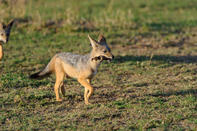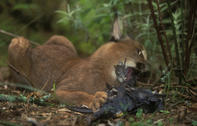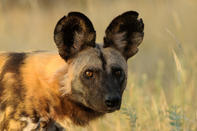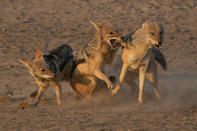Where predators used to be seen as the “enemy” that has to be destroyed at all costs, farmers these days realise that besides helping to maintain a balanced ecosystem, residential predators may actually help to combat livestock losses.

Research has also proven that the indiscriminate killing of predators can backfire, resulting in all kinds of other “problems” and unintentional consequences.
So instead of keeping predator numbers low through indiscriminate management practices, farmers should rather focus on ways to farm in harmony with their resident predators and only target individuals that cause persistent and repeated livestock losses.
Territorial Dominance

One reason why it makes sense to look after residential predators, is that the majority of predators are territorial. Their presence, in effect, helps to keep other predators at bay and, in effect, out of your space. The size of territory varies from one species to another and also depends on the availability of food.
A dominant male leopard may have a territory ranging over 10 000 ha, with this territory overlapping that of more than one female’s. Since leopards directly compete with caracal for food and prey on jackals, their removal from an area, usually leads to a rise in black-backed jackal and caracal numbers.
Good Leaders

Another reason to look after your resident predators, is that the removal of a dominant animal may leave a void in the hierarchy of the group. This void may be filled by juvenile, less experienced or aged outcasts, that often have smaller, more concentrated territories and are far more likely to be livestock thieves, as described in the Practical Farmers Manual by Bool Smuts.
The indiscriminate removal of African wild dogs, for example, will not only coincide with an increase in jackal and caracal problems, but may also lead to juvenile African wild dogs not learning from their elders to hunt properly and then reverting to livestock as their main source of food.
Having a resident and dominant caracal that is not a stock “thief”, has also been identified as one of the best ways to keep other caracal and predators out.
Unintentional Consequences

Natural Prey Base
Rising competition for food due to agricultural development, urbanisation and drought has a negative impact on the food sources available to predators and often lead to predators reverting to livestock for food.
To prevent this from happening, farmers should look after their farm holistically, ensuring there is enough natural veld or land to support the natural prey of predators and also by keeping vulnerable livestock out of the Predators’ way.
By Glenneis Kriel